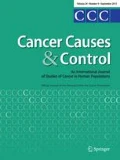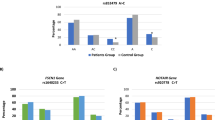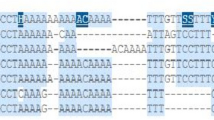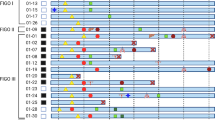Abstract
Epigenetic silencing of retinoic acid receptor-beta2 (RARbeta2) and estrogen receptor-alpha (ERalpha) expressions have been revealed to be important in the development of approaches for diagnosis and therapy of breast cancer. We aimed to explore the correlation of some potential factors with the hypermethylation status of RARbeta2 and ERalpha genes among Iranian breast cancer patients. The hypermethylation status was investigated in 137 dissected tissues from primary breast cancer patients through methylation-specific PCR. Overall, the methylation frequencies of RARbeta2 and ERalpha genes were observed in 36.5 and 51.1% of participants, respectively. The hypermethylated RARbeta2 was associated with younger age at diagnosis and negative family history of breast cancer. The hypermethylation of ERalpha was correlated positively with smoking, duration of estradiol exposure, ER-negativity in tumors and body mass index (at 5 years ago). The plasma levels of folate and vitamin B12 were inversely related to the hypermethylation status of ERalpha, after controlling for covariates. The risk of ERalpha hypermethylation was increased with high plasma level of total homocysteine. In conclusion, our data provide new insights into the possible effect of some lifestyle-related factors on the aberrant methylation drift of ERalpha and RARbeta2 genes in breast cancer.



Similar content being viewed by others
References
Widschwendter M, Berger J, Hermann M et al (2000) Methylation and silencing of the retinoic acid receptor-beta2 gene in breast cancer. J Natl Cancer Inst 92:826–832
Atri M, Jafarimojarad E, Javidroozi M, Mehdipour P (2003) Lack of association between early onset of breast cancer and numbers of affected relatives in an Iranian population. Fam Cancer 2:117–118
Fackler MJ, McVeigh M, Evron E et al (2003) DNA methylation of RASSF1A, HIN-1, RAR-beta, Cyclin D2 and twist in in situ and invasive lobular breast carcinoma. Int J Cancer 107:970–975
Rousseaua C, Petterssona F, Couturea MC et al (2003) The N-terminal of the estrogen receptor (ER) mediates transcriptional cross-talk with the retinoic acid receptor in human breast cancer cells. J Steroid Biochem Mol Biol 86:1–14
Nass SJ, Herman JG, Gabrielson E et al (2000) Aberrant methylation of the estrogen receptor and E-cadherin 5′ CpG islands increases with malignant progression in human breast cancer. Cancer Res 60:4346–4348
Lapidus RG, Nass SJ, Butash KA et al (1998) Mapping of ER gene CpG island methylation by methylation-specific polymerase chain reaction. Cancer Res 58:2515–2519
Herman JG, Graff JR, Myhanen S, Nelkin BD, Baylin SB (1996) Methylation-specific PCR: a novel PCR assay for methylation status of CpG islands. Proc Natl Acad Sci USA 93:9821–9826
Youssef EM, Lotan D, Isaa JP et al (2004) Hypermethylation of the retinoic acid receptor β2 gene in head and neck carcinogenesis. Clin Cancer Res 10:1733–1742
Shukla S, Mirza S, Sharma G et al (2006) Detection of RASSFIA and RARb hypermethylation in serum DNA from breast cancer patients. Epigenetics 1:88–93
Johnson IT, Belshaw NJ (2008) Environment, diet and CpG island methylation: epigenetic signals in gastrointestinal neoplasia. Food Chem Toxicol 46:1346–1359
Bean GR, Ibarra C, Drendall C et al (2007) Hypermethylation of the breast cancer-associated gene 1 promoter does not predict cytologic atypia or correlate with surrogate end points of breast cancer risk. Cancer Epidemiol Biomarkers Prev 16:50–56
Chen Y, Toland AE, McLennan J et al (2006) Lack of germ-line promoter methylation in BRCA1-negative families with familial breast cancer. Genet Test 10:281–284
Baldwin RL, Nemeth E, Tran H et al (2000) BRCA1 promoter region hypermethylation in ovarian carcinoma: a population-based study. Cancer Res 60:5329–5333
Chan AO, Issa JP, Morris JS, Hamilton SR, Rashid A (2002) Concordant CpG islands methylation in hyperplastic polyposis. Am J Pathol 160:529–536
Euhus DM, Bu D, Milchgrub S et al (2008) DNA methylation in benign breast epithelium in relation to age and breast cancer risk. Cancer Epidemiol Biomarkers Prev 17:1051–1059
Issa JP (2000) CpG-island methylation in aging and cancer. Curr Top Microbiol Immunol 249:101–118
Li S, Rong M, Iacopetta B (2006) DNA hypermethylation in breast cancer and its association with clinicopathological features. Cancer Lett 237:272–280
Herceg Z (2007) Epigenetics and cancer: towards an evaluation of the impact of environmental and dietary factors. Mutagenesis 22:91–103
Gunter MJ, Leitzmann MF (2006) Obesity and colorectal cancer: epidemiology, mechanisms and candidate genes. J Nutr Biochem 17:145–156
Nkhata KJ, Ray A, Dogan S, Grande JP, Cleary MP (2009) Mammary tumor development from T47-D human breast cancer cells in obese ovariectomized mice with and without estradiol supplements. Breast Cancer Res Treat 114:71–83
Brait M, Ford JG, Papaiahgari S et al (2009) Association between lifestyle factors and CpG island methylation in a cancer-free population. Cancer Epidemiol Biomarkers Prev 18:2984–2991
Lin RK, Hsieh YS, Lin P et al (2010) The tobacco-specific carcinogen NNK induces DNA methyltransferase 1 accumulation and tumor suppressor gene hypermethylation in mice and lung cancer patients. J Clin Invest 120:521–532
Swafford DS, Middleton SK, Palmisano WA et al (1997) Frequent aberrant methylation of p16INK4A in primary rat lung tumors. Mol Cell Biol 17:1366–1374
Davis C, Uthus EU (2004) DNA methylation, cancer susceptibility, and nutrient interaction. Exp Biol Med (Maywood) 229:988–995
Kim YI (2004) Folate and DNA methylation: a mechanistic link between folate deficiency and colorectal cancer? Cancer Epidemiol Biomarkers Prev 13:511–519
Friso S, Choi W, Girelli D et al (2002) A common mutation in the 5, 10-methylenetetrahydrofolate reductase gene affects genomic DNA methylation thorough an interaction with folate status. Proc Natl Acad Sci U S A 99:5606–5611
Eckel RH, Krauss RM (1998) American Heart Association call to action: obesity as a major risk factor for coronary heart disease. Circulation 97:2099–2100
Cote S, Sinnett D, Momparler RL (1998) Demethylation by 5-aza-2′-deoxycitidine of specific 5-methylcytosine sites in the promoter region of retinoic acid receptor beta gene in human colon carcinoma cells. Anticancer Drugs 9:743–750
Pappas J, Toulouse A, He′bertx J, Fetni R, Bradle WEC (2008) Allelic methylation bias of the RARB2 tumor suppressor gene promoter in cancer. Gene Chromosom Cancer 47:978–993
Giacinti L, Claudio PP, Lopez M, Giordano A (2006) Epigenetic information and estrogen receptor alpha expression in breast cancer. Oncologist 11:1–8
Lapidus RG, Ferguson AT, Ottaviano YL et al (1996) Methylation of estrogen and progesterone receptor gene 5′ CpG islands correlates with lack of estrogen and progesterone receptor gene expression in breast tumors. Clin Cancer Res 2:805–810
Wei M, Xu EJ, Dignam J et al (2008) Estrogen receptor a, BRCA1, and FANCF promoter methylation occur in distinct subsets of sporadic breast cancers. Breast Cancer Res Treat 111:113–120
McCourt CK, Mutch DG, Gibb RK et al (2007) Body mass index: relationship to clinical, pathologic and features of microsatellite instability in endometrial cancer. Gynecol Oncol 104:535–539
Lai JC, Chen YW, Chio HL et al (2005) Gender difference in estrogen receptor alpha promoter hypermethylation and its prognostic value in non-small cell lung cancer. Int J Cancer 117:974–980
Kim DH, Kim JS, Ji YI et al (2003) Hypermethylation of RASSF1A promoter is associated with the age at starting smoking and a poor prognosis in primary non-small cell lung cancer. Cancer Res 63:3743–3746
Gabriel HE, Crott JW, Ghandour H et al (2006) Chronic cigarette smoking is associated with diminished folate status, altered folate form distribution, and increased genetic damage in the buccal mucosa of healthy adults. Am J Clin Nutr 83:835–841
Zhang S, Hankinson SE, Hunter DJ et al (2005) Folate intake and risk of breast cancer characterized by hormone receptor status. Cancer Epidemiol Biomarkers Prev 14:2004–2008
van Engeland M, Weijenberg MP, Roemen GM et al (2003) Effects of dietary folate and alcohol intake on promoter methylation in sporadic colorectal cancer: the Netherlands cohort study on diet and cancer. Cancer Res 63:3133–3137
Friso S, Lamon-Fava S, Jang H et al (2007) Oestrogen replacement therapy reduces total plasma homocysteine and enhances genomic DNA methylation in postmenopausal women. Br J Nutr 97:617–621
Acknowledgments
We are thankful to all participating patients and our valued colleagues in Day General Hospital. We are also grateful to researches affaire of National Nutrition & Food Technology Research Institute, Shaheed Beheshti University of Medical Sciences, Iran, for providing financial support to conduct this study. The authors are grateful to Dr. Sonia Ijadi-Maghsoudi and Dr. Mohammad-Amin Tabatabaifar for their valuable reading of this manuscript.
Author information
Authors and Affiliations
Corresponding authors
Rights and permissions
About this article
Cite this article
Pirouzpanah, S., Taleban, F.A., Atri, M. et al. The effect of modifiable potentials on hypermethylation status of retinoic acid receptor-beta2 and estrogen receptor-alpha genes in primary breast cancer. Cancer Causes Control 21, 2101–2111 (2010). https://doi.org/10.1007/s10552-010-9629-z
Received:
Accepted:
Published:
Issue Date:
DOI: https://doi.org/10.1007/s10552-010-9629-z




